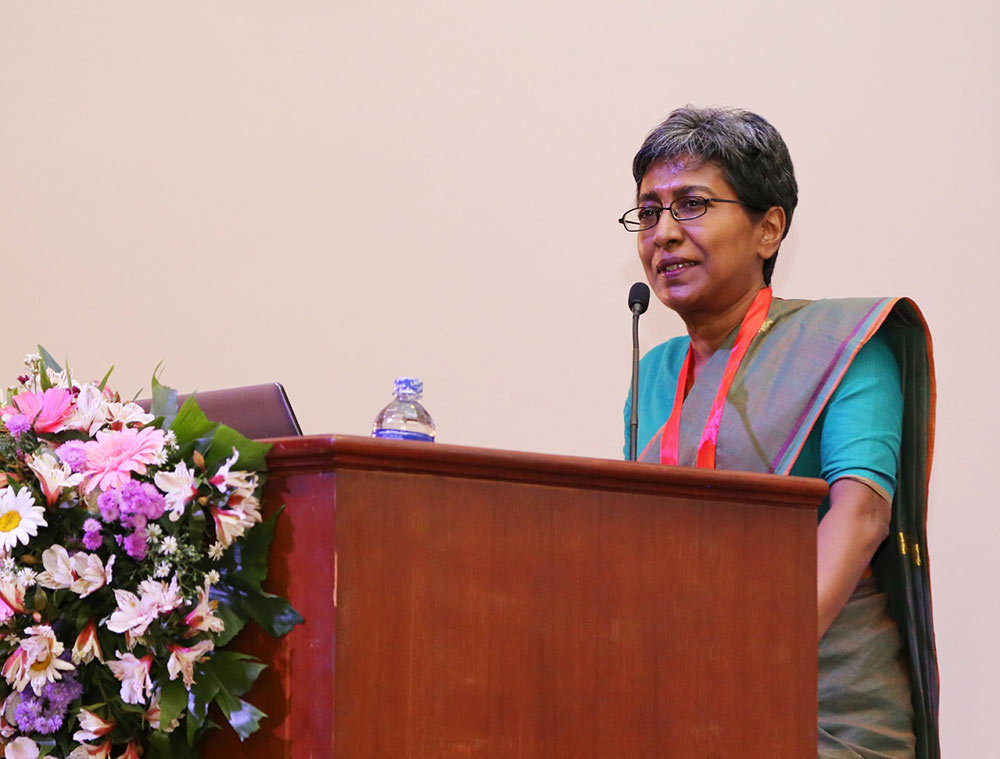
Executive Director of the Institute of Policy Studies of Sri Lanka (IPS), Dr. Dushni Weerakoon this week highlighted the critical role tax policies can play in spurring economic growth of a country, specially a developing country.
Addressing the 23rd Annual Oration on Taxation organized by the Institute of Chartered Accountants of Sri Lanka (CA Sri Lanka) on Monday, 02nd December, she said, “Tax policies can be catalysts in the process of economic growth, especially in a developing country context, where private sectors are less dynamic and where markets are either underdeveloped or are missing.”
An eminent economist, Dr. Weerakoon also went on to say that developing tax policies is a fundamental part of government public finance management. She noted that tax policies have an important bearing on economic decisions and influences people’s choices to work, invest and consume. “As such, not only do they impact economic growth, but they also impact employment, living standards and the quality of life of a country’s population,” she said.
According to Dr. Weerakoon, while opinion varies on which methods of taxation are more or less efficient, tax structures can have a bearing on the different sorts of economic activities that take place. She said that, taken a step further, many countries use taxation policies to promote certain economic sectors with tax breaks and incentives, to encourage job creation by favoring taxes on capital rather than on labor, etc.
“Tax policies that aim to lift growth also go beyond national borders; governments have to be conscious of providing attractive tax treatment to attract foreign direct investment (FDI), but at the same time be wary of tax loopholes that international corporations exploit, especially in today’s digital global economy,” she said.
Dr. Weerakoon believes that marrying these two – the right balance between different economic objectives and tax systems – is not easy, and in many ways, it turns out to be experimental, making it difficult to provide long term certainty and stability as demanded by businesses and investors. “It must also be recognized that tax policies are not made in a vacuum. They are shaped by political economy factors and can often reflect political rather than economic considerations,” she emphasized.
She highlighted that tax revenues have fallen steadily in relation to rising per capita income levels, she also noted that the tax system is also argued to be highly regressive. Indirect taxes continue to account for more than 80 per cent of total tax revenues despite stated intentions to reverse this to a 60:40 ratio. “But Sri Lanka’s tax system is even more regressive than what these numbers imply because of an often overlooked factor – i.e., the spending side. The better off pay rather limited taxes but benefit enormously from free health, education, and many forms of subsidies such as subsidized fuel, electricity, water, etc.,” she said.
“Reviving growth will be a primary preoccupation in 2020. Politicians and policymakers will look first at fiscal tools to do so. A more populist approach to fiscal policy management is not unique to Sri Lanka in today’s global context. Tax cuts to spur investment or raising public spending is gaining ground globally. These underpin President Trump’s fiscal policy, and this is what Boris Johnson is promising the UK electorate in the run up to a crucial decision on Brexit,” she said.
Touching on fiscal policy, Dr. Weerakoon said that the role of fiscal policy in Sri Lanka’s economic development is mixed. She said that on one hand, public spending on education and health saw the country successfully achieve high human development indicators. The downside is that public finances have been at the core of Sri Lanka’s volatile macroeconomic environment. “The economy suffers from what is called a twin-deficit problem – persistent deficits on both the fiscal and external current accounts. This is symptomatic of a country that essentially lives beyond its means; our national expenditure exceeds national income, and we rely on foreigners to finance the gap by way of capital inflows,” she noted.
According to Dr. Weerakoon, the aim of fiscal consolidation therefore is to stabilize debt levels in the long run, by laying out plans to reduce fiscal deficits. “Ideally, the moment to turn to austerity is when the economy can bear it. This is what is recommended as a prudent means of carving out space to practice counter-cyclical fiscal policy,” she said.
She added that fiscal reforms are recommended to be implemented when growth is high given that measures to cut spending and/or raise taxes are easier to implement under such conditions. “With surpluses, fiscal policy can then be used as a counter cyclical tool to stimulate an economy by adopting an expansionary policy stance – i.e., cutting taxes and/or raising spending. If surpluses are generated in good times and borrowing limited to only to finance public investment means a more effective counter-cyclical fiscal policy,” she added.


